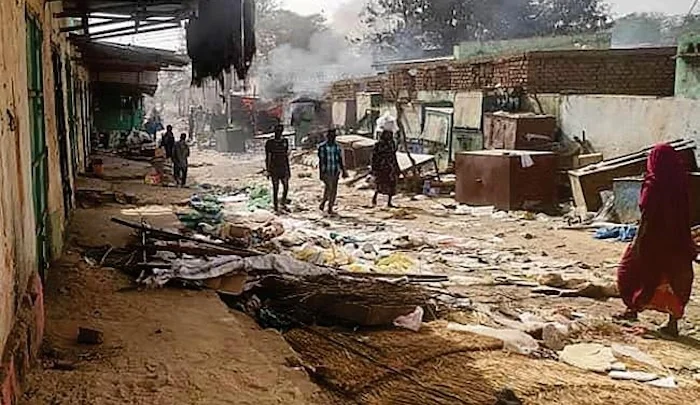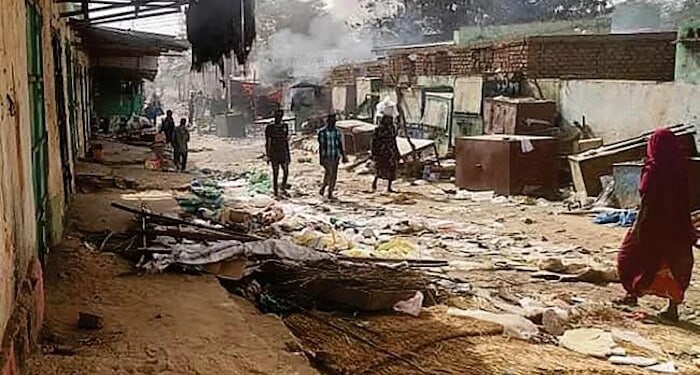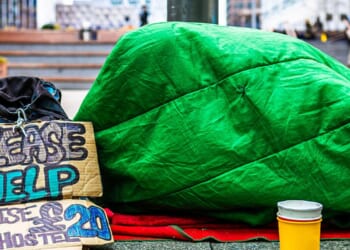
Order Michael Finch’s new book, A Time to Stand: HERE. Prof. Jason Hill calls it “an aesthetic and political tour de force.”
Sign up to attend Michael’s talk in Los Angeles on Thursday, November 20: HERE.
On April 15, 2023, a brutal war broke out in Sudan’s capital Khartoum. This war, which is ongoing, has left tens of thousands dead, as well as millions displaced and out of school. The two main sides in this war are the Sudanese Armed Forces (SAF), which General Abdel Fattah al-Burhan leads, and the paramilitary Rapid Support Forces (RSF), under the leadership of General Mohamed Hamdan “Hemedti” Dagalo.
Both sides are committing war crimes en masse against Sudanese civilians because of their ethnicity or religion. Arab-Islamic supremacy is the main ideological root cause of this violent animosity.
Sudan is a country in northeast Africa, south of Egypt, and along the Red Sea. With over 50 million people and deep diversity, Sudan sits at the crossroads of both Sub-Saharan Africa and the Middle East. It is also the third-largest country on the continent.
The military and RSF were once allies, but that began to change in 2021 after they partnered to overthrow a civilian-led reform government (established just three years prior). Tensions rapidly rose between both sides after the coup. RSF commander Mohamed Dagalo sees himself as Sudan’s next dictator, while SAF generals believe that they are the rightful rulers.
According to the organization “Operation Broken Silence,” there are deep ethnic divisions driving the violence:
- SAF: Elite Nile Valley Arab officers, some of Sudan’s most privileged groups, comprise most of the leadership of this group. While SAF is ethnically mixed at the ground level, Arab supremacy and racism persist. Army units have carried out ethnically targeted attacks on civilians.
- RSF: Arab tribes from Darfur dominate this group. Many commanders and fighters hold a violent, extremely racist ideology that promotes the ethnic cleansing of Darfur’s African communities and subjugation of all other Sudanese Arabs.
Scholars Samir Bhattacharya and Kelvin Benny shed light on the Islamic motives of the warring factions:
Since April 2023, Sudan’s internal war has created an environment of instability marked by ethnic massacres, famine, mass displacement, and foreign interference. This environment of disorder has created a political vacuum in which Islamist forces are gradually reasserting their influence. As the SAF have regained territory in recent months, there are accusations that General Burhan has increasingly relied on Islamist militias, notably the al-Baraa Bin Malik Brigade, Sudan Shield Forces, and other factions aligned with the former National Congress Party (NCP).
The al-Baraa Bin Malik Brigade, named after a prominent Islamic warrior, has played a significant role in major SAF operations, including the March 2025 seizure of the Republican Palace in Khartoum. Beyond their military function, these fighters serve as a political vanguard for the Islamist movement, aiming to re-establish influence within Sudanese governance. Their close relationship with SAF leadership suggests a strategic alliance that advances both immediate military objectives and broader long-term political ambitions.
While the Islamist alignment of SAF has garnered attention, it is imperative to acknowledge that RSF also draws upon Islamist narratives of a different genre. Hemedti’s forces have invoked the legacy of the Mahdist revolution of the late 19th century, an Islamic movement that once controlled large parts of Sudan. The Mahdist regime was marked by brutal tactics, including slavery, famine, and widespread violence, elements that find troubling parallels in the conduct of the RSF during the ongoing conflict.
These two Arab-Islamic supremacist rivals seek to reclaim formal political power, shape the country’s governance framework, and reverse the democratic gains of the 2019 revolution.
The RSF is targeting ethnic African minorities for extermination, and the SAF is blocking aid access to large swaths of the country. The human toll is staggering, reports Operation Broken Silence:
- No one knows the death toll, but 200,000+ people have likely been killed by violence, starvation, and disease outbreaks. This is a conservative estimate based on the very little data that is available, and is likely a severe undercount.
- A staggering 30 million Sudanese — over half of the entire country — are in need of humanitarian assistance. Over 8.7 million Sudanese have descended into emergency or famine conditions.
- Over 14 million people have fled their homes or have left Sudan as refugees.
- More than 65% of the country’s main hospitals are closed or destroyed, with the ones still functioning at risk of closure from shortages of medical staff, supplies, safe water, and electricity. Disease outbreaks are spreading quickly, too.
- 90% of schools are closed, leaving 19 million children with no classroom to attend.
Islam has been a destabilizing force in Africa ever since it invaded the continent in the seventh century. Before the arrival of Islam, Sudan was predominantly Christian, especially in the northern and central regions such as the Nubian kingdoms, which adopted Coptic Christianity. Indigenous traditional and animist beliefs were also widespread, particularly in the southern and eastern parts of the country, among various ethnic groups such as the Beja and Zanj tribes.
Sudan’s Islamization was a prolonged process that spanned centuries, starting in the eighth century, and becoming the dominant religion in the north between the 14th and 16th centuries. While initial contact with Islam occurred during the Arab invasion of Egypt in the seventh century, the indigenous Christian populations of Nubia resisted for a long time. The southern regions of the country were not fully Islamized until much later, with much of the process occurring in the 19th century.
The Arabs in Sudan have, since gaining independence from the British in 1956, pursued the same policy of Islamic and Arab supremacy we see among the warring groups today.
As most of the population is Muslim, modern Sudan has always been a difficult environment for Christians, non-Arabs, and other indigenous African minorities. Marking the country’s complex history is the Darfur genocide that began in 2003, the secession of South Sudan in 2011, and the plight of the Nubian people and other non-Arab communities.
Sudanese researchers Omnia Mustafa and Ghaida Hamdun write:
Arabization policies, implemented during periods of conquest, further inflamed ethnic tensions, culminating in atrocities such as the Darfur genocide, which began in 2003 under the dictatorship of Omar al-Bashir. Al-Bashir’s ruthless reinforcement of Arab supremacy not only suppressed minority ethnic populations but also sowed the seeds for what is now recognized as the first and longest ongoing genocide of the 21st century. The insidious racism directed toward the people of Nuba and South Sudan illuminates how certain ethnic groups in Sudan, despite the universal blackness of the nation, endure heightened suffering due to their perceived proximity to blackness.
The Sudanese experience, caught between the forces of Africanism and Arabism, is marked by identity crises that resonate deeply within the collective consciousness. Racism, from overt bigotry to subtle microaggressions, stains the Sudanese experience in the Middle East and North Africa (MENA) region. Racist remarks and the use of blackface to portray Sudanese characters have become normalized within the Arab entertainment industry—visible manifestations of the underlying antiblack sentiment.
Arab supremacy, far from being benign, not only perpetuates suffering but also has the potential to escalate into genocide. The denial of its existence isn’t merely an oversight; it becomes a dangerous force that blinds societies to the real consequences of such supremacist ideologies. In Sudan, Arab supremacy has become pervasive and destructive, dictating policies and attitudes that exacerbate suffering and deepen divisions.
Despite the undeniable consequences, a paradoxical phenomenon unfolds within Sudanese communities. Amid the chaos and strife, many individuals proudly cling to their Arab identity while distancing themselves from their African heritage. This dynamic is rooted in the ideology of Arab supremacy, which falsely dictates that Africans are inherently inferior to Arabs. This internalized superiority complex has severe consequences for the nation, further fragmenting an already fractured society.
Since their 1956 independence, the Sudanese have lived through 35 coups, attempted coups and coup plots – more than any other African country.
The 1989 coup installed Omar al-Bashir as president. His regime subsequently worked towards forming an Islamic state at the expense of other religious groups. Over the course of three decades, al-Bashir’s rule fused Islamist doctrine with state power. The Islamization of Sudanese society, marginalization of peripheral regions, and sheltering of global Islamist militants such as Osama bin Laden characterized that period. The regime also engaged in sponsoring and harboring Islamic terrorism, as well as trafficking weapons. Al-Bashir employed all means available to stay in power, including the mobilization of tribal Arab militias. These militias committed grave human rights violations, including the human trafficking of non-Arabs. These Islamic groups targeted Christians with particular brutality, viewing them as both foreign and a threat to the nation.
The 2019 uprising against longtime dictator al-Bashir created a military-civilian transitional government. The collapse of the al-Bashir regime signified a major turning point in Sudan’s political trajectory. A broad pro-democracy coalition, which sought to dismantle al-Bashir’s legacy, drove the uprising. However, according to scholars Samir Bhattacharya and Kelvin Benny, the transitional arrangements that followed left key power structures, including the SAF and RSF, intact. The situation created conditions conducive to a counter-revolutionary resurgence.
The military coup in 2021 led to ongoing protests and unrest, culminating in violent clashes between the Rapid Support Forces (RSF) and the Sudanese army in April 2023. These internal conflicts have since caused extensive death, famine, displacement and destruction.
Along with their affiliated groups, both sides have inflicted widespread sexual violence on women and girls — including rape, gang-rape and sexual slavery. Much of the violence was directed at the ethnic African Masalit tribe, which comprised the majority in El Geneina until the attacks forced their mass exodus from the city.
In Sudan, Christians and Church leaders are among the most frequent targets. Last month, Sudan deported more than 100 predominantly Christian, South Sudanese women from Khartoum, in what critics say was for both religious and political reasons. At least 61 of the deported women were separated from their children.
During Sudan’s war, both sides have turned the female body into a battlefield, using rape as a war tactic, according to the newspaper Le Monde. Cases of rape, abduction, sexual slavery and forced marriage are increasing; there are tens of thousands of victims.
Meanwhile, world leaders have largely turned a blind eye. A smattering of diplomatic efforts has failed to bring about a lasting ceasefire. International aid is only 27% funded for all of 2025, and the year is almost over, leaving millions of Sudanese facing hunger and disease, notes the organization, Operation Broken Silence. Even in refugee camps outside of Sudan, where aid is much easier to deliver, hunger is rampant due to the severe lack of attention.
Thousands of activists who marched for months, wrote letters, protested in the streets and Western university campuses to help Hamas terrorists stay in power in Gaza are completely silent as the Sudanese people are facing an actual genocide at the hands of two brutal Arab-Islamic supremacist forces.
Uzay Bulut is a Turkey-born journalist.

















